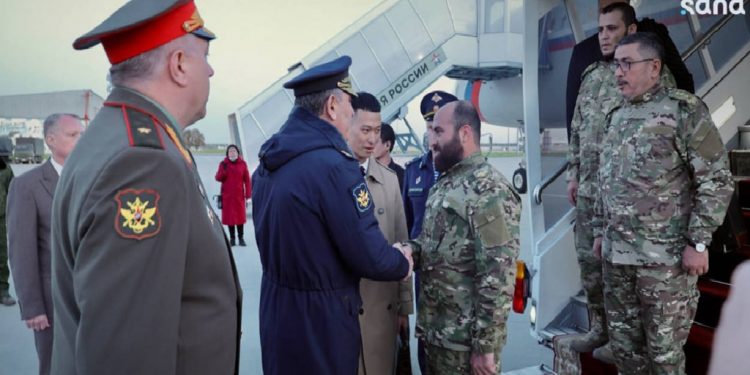A senior delegation from Syria’s Ministry of Defence, led by Chief of the General Staff Maj Gen Ali al-Naasan, arrived in Moscow on Wednesday in a bid to deepen military and security coordination between Damascus and Russia. Though officials have described the visit as part of routine diplomatic engagement, it has triggered fierce domestic criticism, with many viewing it as a premature rapprochement with a former ally widely blamed for widespread destruction during Syria’s civil war.
The delegation was received by Russian Deputy Defence Minister Yunus-bek Yevkurov, according to official statements issued by both the Syrian Defence Ministry and Russia’s Ministry of Defence. Talks are expected to focus on enhancing bilateral cooperation in security and defense, at a time when Russian forces remain stationed at strategic locations in Syria, including the Hmeimim airbase and the Tartous naval facility.
Post-Assad Reset in Relations
The visit is part of a broader diplomatic recalibration following the ouster of Bashar al-Assad in December 2024. It follows a string of high-level meetings aimed at reshaping Syria’s foreign alliances. In July, Syrian Foreign Minister Asaad al-Shaibani and Defence Minister Murhaf Abu Qasra travelled to Moscow for extensive talks with President Vladimir Putin and Foreign Minister Sergey Lavrov—the first such outreach since the fall of the Assad regime. Al-Shaibani met Russian Deputy Prime Minister Alexander Novak on 9 September to explore avenues for economic and energy cooperation.
These engagements underscore the pragmatic approach adopted by Syria’s transitional government under interim President Ahmed al-Sharaa, who is scheduled to attend the Russia-Arab League summit in Moscow on 15 October. Flight-tracking data showed a Russian Air Force Il-62 departed Damascus for Moscow on Monday evening, disabling its transponder mid-flight—an indicator of a diplomatic mission. The same aircraft has previously transported senior Russian envoys including Deputy Foreign Minister Mikhail Bogdanov and special representative Alexander Lavrentyev to Damascus earlier this year.
Domestic Backlash and Social Media Outcry
Despite the official framing, images of the Syrian delegation arriving aboard a Russian military aircraft ignited widespread criticism on social media. Syrian journalist Ahmed al-Ramadan wrote: “Russia killed more of us than Bashar’s gangs. Fine, relations with Russia and state policy—we get it. But have you reached the point of groveling?” He specifically criticized the use of a Russian military cargo plane to transport the delegation.
Journalist Abdulaziz al-Khalifa echoed these sentiments, posting: “Russia abandoned Bashar and lost nothing in Syria—not even an apology. It simply sold him out. So what’s the talk of honor or victory?” Such reactions underscore persistent resentment over Russia’s military intervention, which began in 2015 and helped sustain Assad’s rule through extensive air campaigns. Human rights groups attribute tens of thousands of civilian deaths to Russian operations during that period.
On the tenth anniversary of the intervention, the Syrian Network for Human Rights reiterated its calls for Russia to extradite Assad—who was granted asylum in Russia following his ouster—and to issue an official apology and compensation to victims. The future of Russian military installations in Syria remains a contentious issue, with Damascus demanding clarification on their legal status under the new transitional framework.
Strategic Discussions: Bases, Arms and Sovereignty
Analysts suggest the Moscow visit could lead to undisclosed military arrangements, including new field coordination protocols and potential arms deals to modernize Syrian army units for the post-conflict era.
Of particular importance are expected discussions on the status of the Hmeimim and Tartous bases. The transitional government seeks to recast Russia’s military presence as part of a sovereign partnership, rather than a continuation of Assad-era dependency. Foreign Minister al-Shaibani has previously emphasized the importance of “mutual respect” in Syria’s external relations, while Lavrov has praised the transitional authorities for maintaining the security of Russian assets.
As Moscow seeks to preserve influence in post-Assad Syria, these visits reflect both sides’ attempts to reshape a relationship forged in conflict and now navigating regime change. With President al-Sharaa’s summit appearance imminent, the outcomes of the military delegation’s talks may prove pivotal in redefining Syrian-Russian ties for a new era.
This article was edited by The Syrian Observer. The Syrian Observer has not verified the content of this story. Responsibility for the information and views set out in this article lies entirely with the author.
